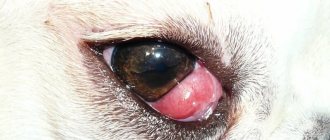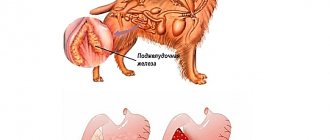Main causes of stomach upset in dogs
Typically, stomach upset refers to diarrhea (diarrhea). In fact, this concept is a little broader, it covers indigestion, problems with acidity and microflora.
All ailments that lead to improper digestion of food or absorption of nutrients from it can be attributed to an upset stomach or gastrointestinal tract.
It is difficult to name the main causes of stomach upset in dogs, since there are so many of them. Root causes can be divided into four categories:
- Incorrect care.
- Inappropriate feeding.
- Acquired or congenital health problems.
- External factors.
In the early stages, stomach upset manifests itself acutely. The dog may experience:
- Diarrhea.
- Constipation.
- Decreased appetite.
- Pain in the abdomen or intestines.
- Pain when trying to go to the toilet.
- Irritation or inflammation of the anus.
- Bad breath.
- Increased gas formation.
- Constant hiccups.
- Belching, accompanied by gagging.
- Vomiting and nausea.
All of the above symptoms may bother your dog for several days and go away without intervention. In this case, the dog’s body heals on its own or the disease progresses to a more severe, chronic stage. The problem is that a dog's gastrointestinal tract is very sensitive and the intestinal mucous membranes are quickly destroyed.
Causes of illness
Digestive disorders in animals can occur for a variety of reasons. Most of these reasons are related to diet and diet composition.
- Poor nutrition.
- Poisoning from low-quality products or the poisons and drugs they contain.
- Eating breakdown. We are talking about overeating a dog. For a long time she had a limited diet, but at some point she gains access to an unlimited supply of food. As a result, the animal overeats.
- A sharp transition from dry food to ready-made meals.
- Various viral infections. Moreover, diseases can be both harmless and quite dangerous.
- The presence of parasites in the body.
- Imbalance of intestinal microflora.
- Indigestion.
- Allergic reactions.
- Tumor diseases of the digestive organs.
- Mechanical damage to the mucous membranes of the gastrointestinal tract. They occur when animals swallow foreign objects.
These are not all the causes of stomach upset in a pet. There are many more, but the ones listed above are considered the main ones. They are the first thing a veterinarian pays attention to when making a diagnosis. Only then does he tell the owner how to treat the dog’s indigestion.
Infectious diseases with diarrhea
This group includes inflammation of the gastrointestinal tract caused by bacteria, viruses, parasites:
- Foodborne toxic infections. This word hides disorders associated with opportunistic bacteria - clostridia, campylobacter, and less commonly Escherichia. They live peacefully in the intestines of a healthy dog. As the population increases, the release of toxic products increases. The animal begins to have watery greenish diarrhea and sometimes vomit. Bacteria enter the body along with contaminated meat and dairy products.
- Intestinal parasites. Worms mechanically destroy mucous membranes. Microtraumas bleed, and helminth waste products are toxic to dogs. When examining stool, mucus, streaks of blood, and traces of parasites are found - eggs, larvae, adults.
- Parvovirus enteritis. The first signs of the disease are complete refusal to eat and drink and debilitating vomiting with mucus. After 6 – 24 hours, diarrhea begins. The stool is first watery, yellowish-gray, then green, foul-smelling, sometimes with traces of blood. At the same time, the temperature rises to 39.5 - 41.
- Coronavirus enteritis. The disease develops like a parvovirus infection, but dogs tolerate it more easily.
- Adenoviral hepatitis. The dog becomes lethargic, the lymph nodes and liver enlarge, the cornea of the eye becomes cloudy, severe vomiting and bloody diarrhea begin.
- Plague of carnivores of intestinal form. The symptoms of the disease resemble parvovirus, but the animal does not refuse water. Initial signs are vomiting and diarrhea with white or yellowish foam.
- Pyroplasmosis caused babesiosis. The disease is carried by ixodid ticks. The dog's temperature rises sharply to 40 degrees, the color of the urine changes from dark yellow to brown. On days 2–3, yellow vomiting and diarrhea with blood and mucus begin.
Unvaccinated animals under one year of age are more likely to suffer from viral infections. Puppies under 5 months often die. The only way to protect your pet is to vaccinate it on time.
Chronic disorder and its causes
Indigestion, which is expressed by acute symptoms, can be called more “simple” in terms of diagnosis and treatment. It is much more difficult to detect a chronic disorder of the digestive system.
A chronic disorder, its causes are almost always hidden; symptoms appear at that stage of the disease when the dog’s health is compromised. Another difficulty is that chronic indigestion can be either an independent disease or a symptom of a malfunction of almost all organs and systems of the body.
A chronic disorder develops as an independent disease if a dog suffers from an acute disorder for a long time. Fighting for survival, the body stops the symptoms that cause the dog to lose water. Against the background of spontaneous elimination of symptoms in the form of diarrhea and vomiting, disruption of the gastrointestinal tract is constantly getting worse.
Chronic indigestion as a symptom is a very alarming sign for the owner. Below are just some of the diseases that cause problems in the gastrointestinal tract:
- Ulcer.
- Neoplasms, including cancer.
- Gastritis, colitis, gastroenteritis.
- Pancreatitis.
- Diabetes.
- Kidney and liver failure.
- Dysbacteriosis.
Important! Symptoms of an upset stomach may indicate a viral illness. In this case, the dog experiences accompanying symptoms: fever, weakness, apathy, a sharp deterioration in the quality of the coat, refusal to feed, etc.
Stomach Remedies for Dogs
Sometimes you really need commercially available products to help with your dog's upset stomach. We do not recommend giving these products to your pet without a clear recommendation, or at least a signal of permission, from your veterinarian. Although these products are widely used to treat indigestion in dogs, there is actually no guarantee that your dog will benefit from them as he may have another cause for his indigestion. Remember that stress can also upset a dog's tummy.
However, you may be interested in giving your dog any of the following::
- Oral rehydration solution . We've already mentioned above what oral rehydration salts can do for your dog. These foods provide your dog with water and electrolytes that may have been lost due to diarrhea. They should only be used in cases of mild dehydration, as moderate dehydration often requires resuscitation with intravenous fluids.
- Rice based probiotics . Research shows that rice water is an excellent way to treat mild to moderate gastroenteritis in infants. Other studies indicate that it is more effective than oral rehydration salt solution. This is why the World Health Organization recommends giving rice water to infants suffering from infantile gastroenteritis. Now, if rice water can tame tummy upsets in babies, it should work the same for your dogs, right? Technically this should provide the same benefit. Unfortunately, some dogs may have difficulty digesting it, especially puppies. However, there are some probiotic products that mimic the natural benefits of rice water as a treatment for indigestion in dogs. So you can check it out. However, we also recommend consulting with your veterinarian.
Symptoms
Signs of acute gastritis appear clearly, and the dog owner is able to make a preliminary diagnosis. In the chronic course of the process, the symptoms are erased. Individual signs may appear one by one in the dynamics of pathogenesis or appear immediately. The following symptoms are typical for gastritis:
- Touching the belly is painful and the dog whines.
- The pet refuses food.
- Diarrhea or constipation develops.
- The dog is constantly sick and sometimes vomits.
- The animal refuses to play and does not respond to commands. Prefers to lie down.
- The dog constantly laps up the water and salivates profusely.
- A grayish-white coating appears on the tongue.
- There is an unpleasant odor coming from the mouth.
- The pet is exhausted, the fur is dull and disheveled.
Causes of stomach upset in dogs
When choosing the type of food and organization of care for your dog, it is important to take into account provoking factors that can lead to chronic and acute health problems. Simply put, prevention is better than cure for any health problem.
Many inexperienced owners make common mistakes that lead to an upset stomach in their dog. Moreover, there are provoking factors in which an upset stomach is quite natural. Let's figure out in what cases disturbances in the functioning of the stomach and intestines are a natural consequence.
Taking antibiotics as a cause of digestive upset in dogs
Even the most gentle therapy has a detrimental effect on the functioning of all body systems. The first system that suffers from medications is the gastrointestinal tract. The reason is that the walls of a dog's stomach and intestines are very delicate. At the slightest disturbance in acidity or a detrimental effect on the microflora, the dog develops a disorder.
Taking antibiotics is considered one of the most common causes of dysbiosis. It is important to understand that even a short course of gentle antibiotics kills not only pathogenic bacteria, but also friendly microflora. An antibiotic does not distinguish between the type of bacteria; its task is to destroy all living things.
Note! With prolonged or aggressive treatment with antibiotics, severe dysbiosis develops, in which the dog’s body is unable to digest and assimilate food.
To prevent the development of dysbiosis, in parallel with treatment with antibiotics or other aggressive agents, the dog is prescribed special supplements with probiotics and prebiotics. If supplements were not prescribed in a timely manner, a rehabilitation course should be carried out after the end of treatment.
Childbirth as a cause of indigestion in dogs
One of the most serious stresses for the body, not counting viral and infectious diseases, is pregnancy and childbirth. From the first day of conception, throughout the entire period of gestation, the expectant mother’s body prepares for childbirth. At this time, all systems of the body are rebuilt, even the skeleton undergoes changes. Under the strict guidance of the hormonal system, the dog’s organs work “for wear and tear”, ensuring the viability of not only the expectant mother, but also the embryos.
During childbirth, a huge amount of hormones enter the dog’s blood, which “spur” the body to work even more actively. During contractions and pushing, the dog develops dehydration and is constantly in a state of stress. However, adrenaline and other hormones prevent the animal from dying from shock and force it to act instinctively.
After birth, when the new mother feeds the puppies and comes to her senses, the consequences of overload appear. Irritation of the intestinal mucous membranes, followed by diarrhea and stomach upset, are considered expected complications. Usually, if the dog is healthy and the birth was not too difficult, the functioning of the body's systems is restored within 48 hours.
Indigestion in dogs treatment symptoms and treatment
If you are looking for some home remedies to possibly help your dog who has an upset stomach, you are on the right track.
After several years of working in a veterinary clinic, I learned that such remedies exist. They can be used in cases of minor eating disorders.
We advised their use in times when there were few veterinary clinics, and owners could not always quickly take their pet to a doctor. The ingredients for these products can be found in almost any kitchen.
Before you start treating your dog yourself:
[1]. Determine if your dog actually has a digestive disorder and needs treatment with home remedies
Not all dogs are suitable for home treatment.
In general, it should be carried out only in cases where you cannot quickly get an appointment with a veterinarian because you live too far from the clinic, or because the clinic is closed that day.
In the vast majority of cases, dogs with eating disorders must be treated by a veterinarian.
Often dogs have obstruction of the digestive tract, enterocolitis and pancreatitis, and these diseases and conditions can result in the death of the animal if treated at home. Only a veterinarian can guarantee a complete cure.
When food poisoning occurs in dogs, the following symptoms are observed:
- vomit;
- diarrhea;
- salivation;
- the need to eat grass;
- loss of appetite;
- flatulence;
- rumbling in the stomach.
Warning! If there is swelling in the dog's abdominal area, the dog itself has become very nervous, it produces more saliva, and the urge to vomit does not cause vomiting, it must be immediately taken to the veterinarian, since such a condition is very dangerous. If there is nothing like that, you can proceed to the next step.
[2]. Check if your dog is dehydrated
If your pet has been vomiting and diarrhea for some time, it means that there is not enough fluid in his body.
Functions of the intestines in the body
It is generally accepted that the standard functions of the intestines in the body are exclusively the digestion and absorption of food.
But this is not true at all. The tasks of this body are much more varied and important:
- The intestine plays a very important role in the formation and maintenance of immunity, since the maturation of certain forms of lymphocytes occurs in its lymphoid tissue.
- The large intestine is home to many symbiotic microorganisms, through which the animal’s body receives a lot of vitamins and protein.
- Removing toxic and harmful substances from the body.
Breed characteristics
Breed characteristics related to the health of the dog should be known to the owner before purchasing the puppy. The fact is that many breeds are prone to a number of hereditary diseases.
Nutrition and methods of care are selected taking into account the breed characteristics. Let's look a little more closely.
Stomach upset in small breed dogs
Small breed dogs often have a tendency to:
- Sensitivity of the digestive system.
- Food allergies.
- Individual intolerance to certain foods.
- Weight gain, especially in old age.
- Early deterioration and loss of teeth.
All of the above reasons can be considered provoking factors for chronic disorders of the gastrointestinal tract. In addition, the smaller the dog, the more likely it is that it will not be able to chew food well. It is important to remember that chewing is a stage of food digestion. During chewing, food is processed by saliva and partially fermented.
If your dog has weak or missing teeth, the food must be thoroughly ground. In addition, it is advisable to give only heat-treated foods to dogs that are not able to grind food on their own.
Stomach upset in medium and large breed dogs
Medium and large breed dogs often have a tendency to:
- Volvulus is a deadly condition, the first symptoms of which are disruption of the gastrointestinal tract. The wider the dog's chest, the higher the risk of bloat.
- Food allergies.
- Weight gain, especially during puppyhood and old age.
- Chronic dysbacteriosis.
When keeping medium and large dogs, you should always take into account that the symptoms of any disease are not as pronounced as in small pets. The body of a large dog is potentially stronger, so it takes longer to fight illnesses on its own, including disorders of the gastrointestinal tract.
Important! It is extremely important to feed large dogs properly. The larger the dog, the later it develops symptoms of dysbiosis, and the older the dysbiosis, the more difficult it is to cure.
Analyze your dog's feeding history over 3 days
Among people, one of the most important assessment activities when a patient has an upset stomach is to recall food intake for both the next 24 hours and the past 3 days. Technically, remembering what you ate in the last 24 hours is much easier than remembering what you ate in the last 3 days. Unfortunately, if the cause of your stomach upset is a microorganism, it usually takes more than 3 days before you see any signs. However, toxins and other stomach irritants can almost always cause an immediate reaction, usually within a few hours of entering the stomach and small intestine.
Meal recall in dogs can be challenging, especially if your dog also leaves the house. If he is confined to his kennel, then determining what he has eaten should be relatively easy; unless he ate the cockroach he pounced on as the creature walked past the dog's cage. Dogs are known to be very curious. And so when they're out and about, they really have a tendency to "taste" just about anything they can smell. They may ingest mushrooms and even flowers, which may not be harmful to us, but may contain toxins that are definitely harmful to dogs. Your trash is also a great source of possible stomach irritation. So, you can be the detective you've always wanted to be to figure out what's causing your dog's stomach upset.
Treatment regimen and main drugs
If you have an upset stomach that threatens to develop into a chronic form, it is better not to self-medicate, but to consult a veterinarian. If you are unable to consult with a veterinarian or the visit had to be postponed, the standard treatment regimen and basic medications are as follows:
- A gentle diet based on fermented milk products.
- In case of a severe allergic reaction, use hypoallergenic industrial food.
- Probiotic and prebiotic supplements.
- Smecta.
- Phosphalugel.
- In case of severe intoxication - Enterosgel.
Note! Taking Enterosgel cannot be combined with other medications and feeding. Enterosgel is a very powerful adsorbent that absorbs not only harmful, but also useful substances that are currently needed by the body.
What to feed your dog if he has an upset stomach
Many owners do not know what to feed their dog if they have an upset stomach. The basic principles are as follows:
- If the dog has diarrhea - a starvation diet, adsorbents and coating drugs for 24 hours.
- If your dog is constipated - fermented milk products, broths, boiled vegetables.
- If the dog has an allergic reaction - rice, beef, turkey or lamb broth, neutral vegetables, antihistamines.
- If the dog has an acute pain reaction, we exclude grains and vegetables, and make up the diet from fermented milk products, broth, chopped and boiled minced meat.
If you experience acute symptoms, fever, refusal to eat or other symptoms that indicate a worsening condition, consult your doctor immediately.
Important! Symptoms of indigestion may indicate volvulus or intestinal blockage, and in this case, if the dog does not receive qualified assistance, it will die within 24 hours.
Monitor your dog's core body temperature
There's a reason why it's important to measure and monitor your dog's body temperature whenever he shows signs of an upset stomach.
- Increased body temperature . An increase in body temperature can mean many things. However, if taken in the context of an upset stomach, it may expose you to the potential cause of your dog's stomach problems. Fever or hyperthermia is considered one of the main or obvious signs of inflammation or, in particular, infection. Fever should be considered a symptom and not a disease. First, it means that your dog's immune system is mounting an effective defense to try to fight off invading microorganisms by raising the dog's body temperature, where it will be quite difficult for the microbes to thrive. It may not kill germs, but raising your body temperature is the body's way of making life harder for germs. So again, fever is a symptom, not a disease. At the same time, he should alert you if something is wrong with your dog.
- Reduced body temperature . A drop in your dog's body temperature due to an upset stomach is often interpreted as a sign of impending hypovolemic shock. Of course, this is not the only reason why dogs can become hypothermic. But when taken in the context of an upset stomach, especially severe dehydration, it simply means there is less blood circulating in your dog's body. It should be noted that blood carries heat. This is why if the body dies, it cools down because the blood is no longer circulating. Of course, this is an oversimplification of the obvious. But the fact is that when a dog is severely dehydrated, less blood circulates throughout the dog's body. This leads to so-called hypovolemic shock. A decrease in body temperature is one of the classic signs of shock.
© shutterstock
Diagnosis of the condition
If you suspect intestinal obstruction, contact your veterinarian. After a thorough visual examination and palpation, the veterinarian will conduct an x-ray examination of the abdominal cavity in two projections. This will allow you to determine where the foci of gas formation are located, the density of which is lower than the density of soft tissue.
Additionally, X-ray images show signs of inflammation affecting the serous membranes of the abdominal cavity (peritonitis). Its presence indicates the need for emergency surgical intervention.
Assigned studies:
- measuring body temperature,
- general/biochemical blood test,
- stool analysis (if possible).
If a simple study does not allow an accurate diagnosis, an x-ray with contrast is prescribed. Barium sulfate is used as a contrast agent. In appearance, it is a fine-crystalline white powder with no specific odor. It is not absorbed from the intestines and is tracked in the images by a contrasting (white) spot.
Dog has indigestion without vomiting
If you are looking for some home remedies to possibly help your dog who has an upset stomach, you are on the right track.
After several years of working in a veterinary clinic, I learned that such remedies exist. They can be used in cases of minor eating disorders.
We advised their use in times when there were few veterinary clinics, and owners could not always quickly take their pet to a doctor. The ingredients for these products can be found in almost any kitchen.
Before you start treating your dog yourself:
[1]. Determine if your dog actually has a digestive disorder and needs treatment with home remedies
Not all dogs are suitable for home treatment.
In general, it should be carried out only in cases where you cannot quickly get an appointment with a veterinarian because you live too far from the clinic, or because the clinic is closed that day.
In the vast majority of cases, dogs with eating disorders must be treated by a veterinarian.
Often dogs have obstruction of the digestive tract, enterocolitis and pancreatitis, and these diseases and conditions can result in the death of the animal if treated at home. Only a veterinarian can guarantee a complete cure.
When food poisoning occurs in dogs, the following symptoms are observed:
- vomit;
- diarrhea;
- salivation;
- the need to eat grass;
- loss of appetite;
- flatulence;
- rumbling in the stomach.
Warning! If there is swelling in the dog's abdominal area, the dog itself has become very nervous, it produces more saliva, and the urge to vomit does not cause vomiting, it must be immediately taken to the veterinarian, since such a condition is very dangerous. If there is nothing like that, you can proceed to the next step.
[2]. Check if your dog is dehydrated
If your pet has been vomiting and diarrhea for some time, it means that there is not enough fluid in his body.
Methods for preventing stomach upset in dogs
Methods for preventing painful conditions include proper care and feeding.
In addition, it is important to follow a number of rules:
- Visit the veterinarian once every six months.
- Carry out parasite prevention once every 3–4 months.
- If the dog eats natural foods, conduct intensive vitamin courses in spring and autumn.
- Monitor dental health and contact a veterinarian if your dog develops tartar.
- Provide the dog with sufficient physical activity, otherwise the pet's metabolism will not work properly.
- Eliminate prohibited foods from your dog's diet.
With a natural type of nutrition, most problems with the functioning of the gastrointestinal tract can be prevented by including high-quality fermented milk products in the diet. If your dog is not lactose intolerant, it is better to include whole, goat's milk in the diet. If you are lactose intolerant, milk is replaced with homemade yogurt, fermented baked milk, and cottage cheese.
Dyspeptic syndrome in dogs treatment
Dyspepsia is a collective term for digestive disorders of a predominantly functional nature that arise as a result of insufficient secretion of digestive enzymes or poor nutrition (nutritional dyspepsia).
There are fermentative, putrefactive and fatty alimentary dyspepsia.
1. Fermentative dyspepsia is associated with excessive consumption of carbohydrates (sugar, honey, flour products, fruits, grapes, peas, beans, cabbage, etc.), as well as fermented drinks (kvass), resulting in the creation of conditions in the intestines for the development of fermentation flora.
Etiology and pathogenesis. The disease occurs due to insufficient digestion of carbohydrates. This is facilitated to a greater extent by carbon-based nutrition, from time to time due to exaggerated dieting or intake of carbohydrates in large quantities, especially in the form of coarse plant fiber.
Reducing gastric secretion is of fundamental importance. With all this, the connective tissue membranes of plant fiber cells are not digested and the carbohydrates contained in them become difficult to access for the diastatic enzymes of the pancreas and small intestine. Digestion of carbohydrates may be impaired when external secretion of pancreatic amylase is decreased.
An increase in the motor function of the small intestine plays a certain role in the pathogenesis of fermentative dyspepsia, which may occur partly due to its irritation by coarse plant fiber. This leads to a reduction in the time of enzymatic processing of carbohydrates. A huge amount of insufficiently digested carbohydrates, mainly contained in plant fiber, causes increased fermentation processes in the lower parts of the ileum.
In the future, the fermentative microbial flora moves to higher located parts of the small intestine, where bacteria can enter together with food, especially when the antibacterial parameters of the gastric contents are lost due to a decrease in gastric secretion.
Saturated fermentation processes lead to the formation of huge quantities of organic acids and gaseous products that irritate the intestinal tract, stimulating its motor function and the release of huge quantities of watery digestive secretions, which leads to diarrhea. Fermentation products are absorbed in large quantities in the intestinal tract and poison the body. Due to the intake of huge amounts of water, pancreatic secretion and exocrine function of the pancreas are reduced, which is aggravated by the dilution of digestive secretions. The use of cool water is especially unfavorable, because with all this the motor function is stimulated gastrointestinal tract.
Naturally, taking a significant amount of carbohydrates, especially in the form of plant fiber, under these conditions can simply result in fermentative dyspepsia.
It is customary to distinguish two types of fermentative dyspepsia. The first type of fermentative dyspepsia is characterized by an excess of acid in the gastric juice (hydrochloric acid, hydrochloric acid), the second type of fermentative dyspepsia is characterized by an increase in the acidity of the gastric juice due to various organic acids contained in food or formed during the fermentation process.
Fermentative dyspepsia of the first type (hyperchlorhydria) Hyperchlorhydria is a condition characterized by an excess content of hydrochloric (hydrochloric) acid in the gastric juice, as well as excessive and too rapid secretion of gastric juice after food enters the stomach.
In normal cases, saliva mixes with food in the mouth, promoting the breakdown of food in the stomach, and about thirty minutes pass from the moment the food is swallowed until the acidity of the gastric juice becomes sufficient to break down the food. With hyperchlorhydria, acid begins to enter the stomach just ten minutes after starting a meal, thereby slowing down or preventing the breakdown of starch. The causes of fermentative dyspepsia can be different: excessive production of acid in the stomach can be caused by stress, eating food too quickly, spicy and spicy foods, and some diseases of the digestive tract.
With fermentative dyspepsia of the first type, the digestion of protein foods (meat, fish, dairy products) proceeds normally, but the process of digestion of starch-containing foods (bread, any flour products) is complicated. As a rule, with hyperchlorhydria, characteristic symptoms of dyspepsia appear an hour after eating and include discomfort or pain in the abdomen, heartburn, nausea, dizziness, and increased heart rate.
Fermentative dyspepsia of the second type (hypochlorhydria) This type of fermentative dyspepsia is characterized by a low content of hydrochloric acid in the gastric juice, and the acidity of the gastric juice increases due to the formation of organic acids. One of the most common causes of fermentative dyspepsia is too rapid absorption of food, overeating, and irregular eating. This type of fermentative dyspepsia is characterized by the opposite situation: protein foods - meat, fish, eggs, dairy products - are digested slowly and difficultly, since there is not enough hydrochloric acid in the gastric juice.
On the other hand, sugar, bread, flour products and any products with a high starch content are broken down by bacteria and become a source of organic acids. Organic acids do not contribute to the digestion of food, but, on the contrary, irritate the stomach, complicate digestion, leading to the appearance of characteristic symptoms - bloating, the appearance of characteristic “rumbling” sounds, a feeling of heaviness in the stomach. If you have this disease, very frequent bloating begins to bother you. In addition, rumbling and transfusion can be heard in the abdominal area.
There is also a feeling of heaviness. Pain sensations are quite possible, which are paroxysmal in nature and make themselves felt in the middle region of the abdomen. Almost always, after defecation, these pain sensations disappear. As for the stool of patients with fermentative dyspepsia, in most cases it takes on a liquid, light yellow appearance. Some patients may also experience mushy feces, during examination of which one can see incompletely digested fruits or vegetables. It should also be noted that the stool in these cases is also endowed with a very strong sour odor. It may also contain bubbles, which give it a foamy appearance. Other symptoms of fermentative dyspepsia include sour belching, nausea, excessive gas, lethargy, irritability and some others.











